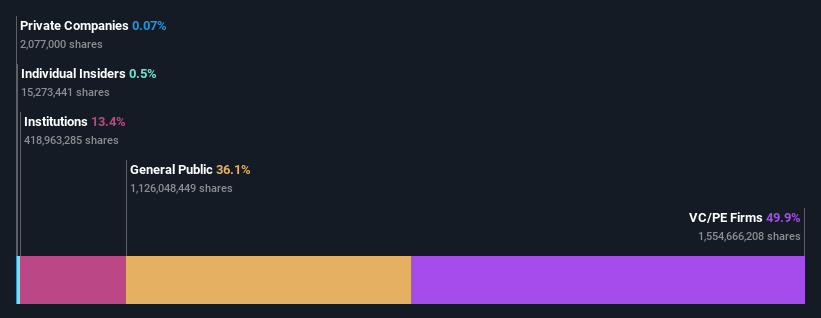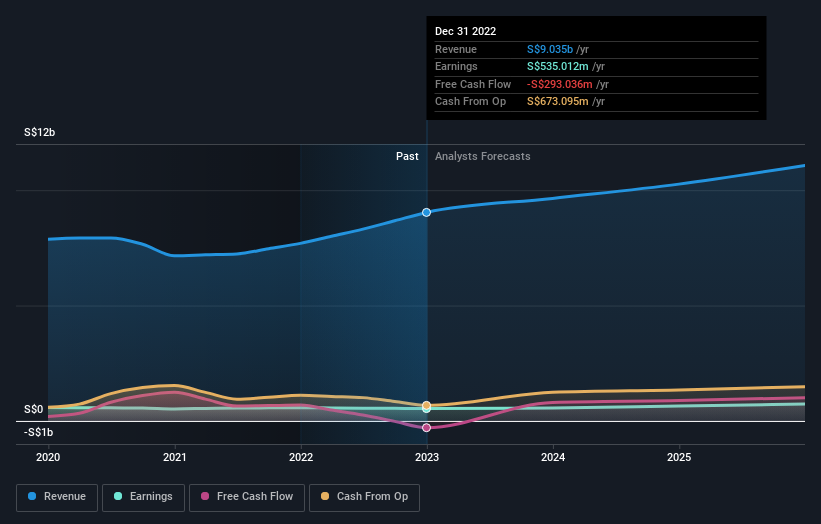- Singapore
- /
- Aerospace & Defense
- /
- SGX:S63
Private equity firms among Singapore Technologies Engineering Ltd's (SGX:S63) largest shareholders, saw gain in holdings value after stock jumped 3.6% last week

Key Insights
- Singapore Technologies Engineering's significant private equity firms ownership suggests that the key decisions are influenced by shareholders from the larger public
- 52% of the business is held by the top 2 shareholders
- Institutions own 13% of Singapore Technologies Engineering
If you want to know who really controls Singapore Technologies Engineering Ltd (SGX:S63), then you'll have to look at the makeup of its share registry. With 50% stake, private equity firms possess the maximum shares in the company. That is, the group stands to benefit the most if the stock rises (or lose the most if there is a downturn).
As a result, private equity firms collectively scored the highest last week as the company hit S$12b market cap following a 3.6% gain in the stock.
Let's delve deeper into each type of owner of Singapore Technologies Engineering, beginning with the chart below.
See our latest analysis for Singapore Technologies Engineering

What Does The Institutional Ownership Tell Us About Singapore Technologies Engineering?
Many institutions measure their performance against an index that approximates the local market. So they usually pay more attention to companies that are included in major indices.
Singapore Technologies Engineering already has institutions on the share registry. Indeed, they own a respectable stake in the company. This can indicate that the company has a certain degree of credibility in the investment community. However, it is best to be wary of relying on the supposed validation that comes with institutional investors. They too, get it wrong sometimes. It is not uncommon to see a big share price drop if two large institutional investors try to sell out of a stock at the same time. So it is worth checking the past earnings trajectory of Singapore Technologies Engineering, (below). Of course, keep in mind that there are other factors to consider, too.

Hedge funds don't have many shares in Singapore Technologies Engineering. Looking at our data, we can see that the largest shareholder is Temasek Holdings (Private) Limited with 50% of shares outstanding. Meanwhile, the second and third largest shareholders, hold 1.9% and 1.8%, of the shares outstanding, respectively.
A more detailed study of the shareholder registry showed us that 2 of the top shareholders have a considerable amount of ownership in the company, via their 52% stake.
While studying institutional ownership for a company can add value to your research, it is also a good practice to research analyst recommendations to get a deeper understand of a stock's expected performance. Quite a few analysts cover the stock, so you could look into forecast growth quite easily.
Insider Ownership Of Singapore Technologies Engineering
The definition of company insiders can be subjective and does vary between jurisdictions. Our data reflects individual insiders, capturing board members at the very least. Company management run the business, but the CEO will answer to the board, even if he or she is a member of it.
I generally consider insider ownership to be a good thing. However, on some occasions it makes it more difficult for other shareholders to hold the board accountable for decisions.
Our information suggests that Singapore Technologies Engineering Ltd insiders own under 1% of the company. It is a very large company, so it would be surprising to see insiders own a large proportion of the company. Though their holding amounts to less than 1%, we can see that board members collectively own S$57m worth of shares (at current prices). In this sort of situation, it can be more interesting to see if those insiders have been buying or selling.
General Public Ownership
With a 36% ownership, the general public, mostly comprising of individual investors, have some degree of sway over Singapore Technologies Engineering. This size of ownership, while considerable, may not be enough to change company policy if the decision is not in sync with other large shareholders.
Private Equity Ownership
Private equity firms hold a 50% stake in Singapore Technologies Engineering. This suggests they can be influential in key policy decisions. Some might like this, because private equity are sometimes activists who hold management accountable. But other times, private equity is selling out, having taking the company public.
Next Steps:
It's always worth thinking about the different groups who own shares in a company. But to understand Singapore Technologies Engineering better, we need to consider many other factors. For example, we've discovered 2 warning signs for Singapore Technologies Engineering that you should be aware of before investing here.
If you would prefer discover what analysts are predicting in terms of future growth, do not miss this free report on analyst forecasts.
NB: Figures in this article are calculated using data from the last twelve months, which refer to the 12-month period ending on the last date of the month the financial statement is dated. This may not be consistent with full year annual report figures.
New: Manage All Your Stock Portfolios in One Place
We've created the ultimate portfolio companion for stock investors, and it's free.
• Connect an unlimited number of Portfolios and see your total in one currency
• Be alerted to new Warning Signs or Risks via email or mobile
• Track the Fair Value of your stocks
Have feedback on this article? Concerned about the content? Get in touch with us directly. Alternatively, email editorial-team (at) simplywallst.com.
This article by Simply Wall St is general in nature. We provide commentary based on historical data and analyst forecasts only using an unbiased methodology and our articles are not intended to be financial advice. It does not constitute a recommendation to buy or sell any stock, and does not take account of your objectives, or your financial situation. We aim to bring you long-term focused analysis driven by fundamental data. Note that our analysis may not factor in the latest price-sensitive company announcements or qualitative material. Simply Wall St has no position in any stocks mentioned.
About SGX:S63
Singapore Technologies Engineering
Operates as a technology, defence, and engineering company worldwide.
Solid track record with reasonable growth potential.
Similar Companies
Market Insights
Community Narratives



